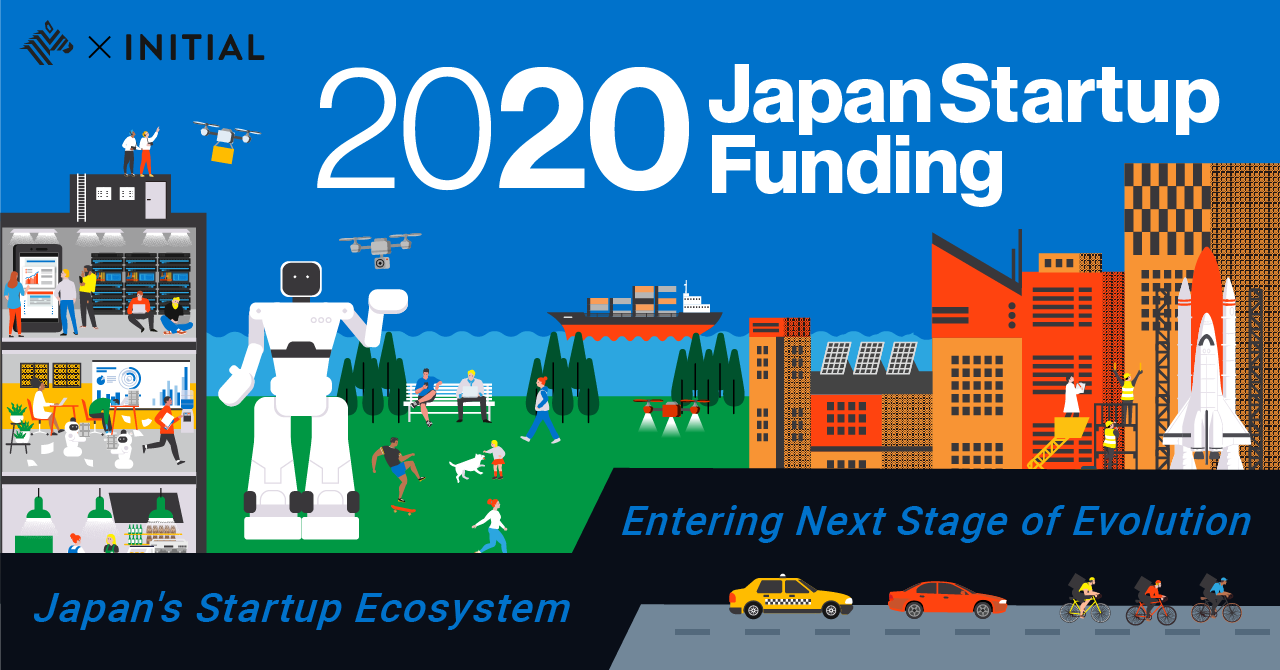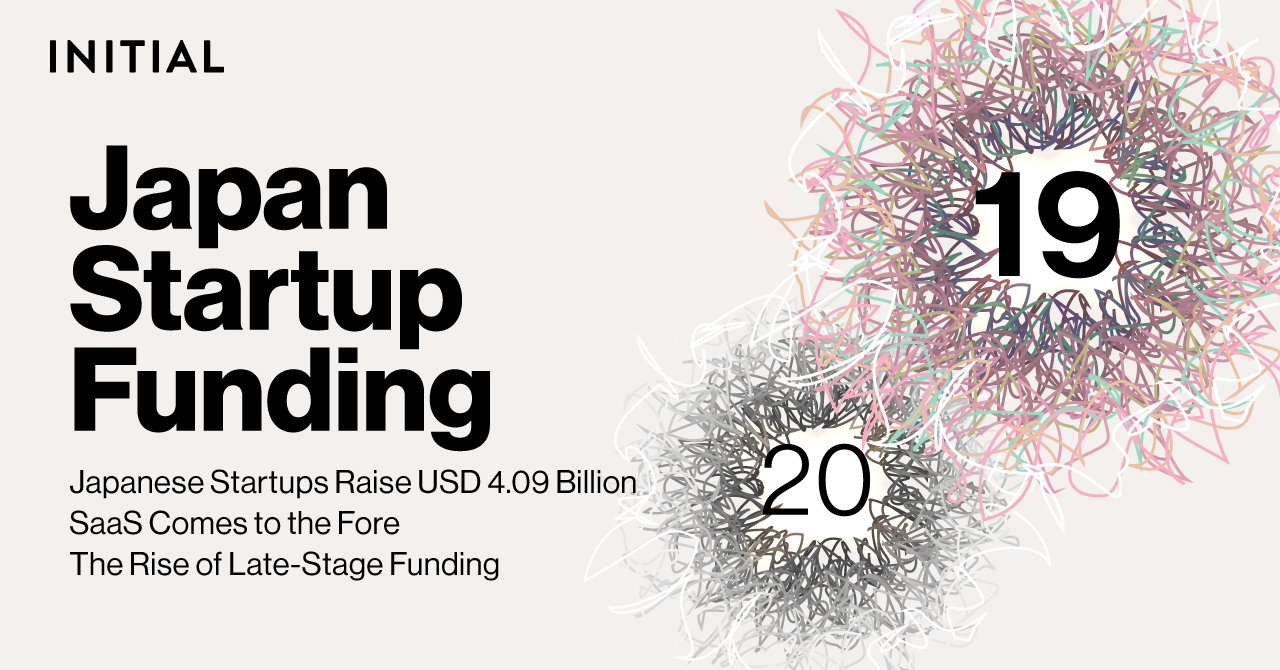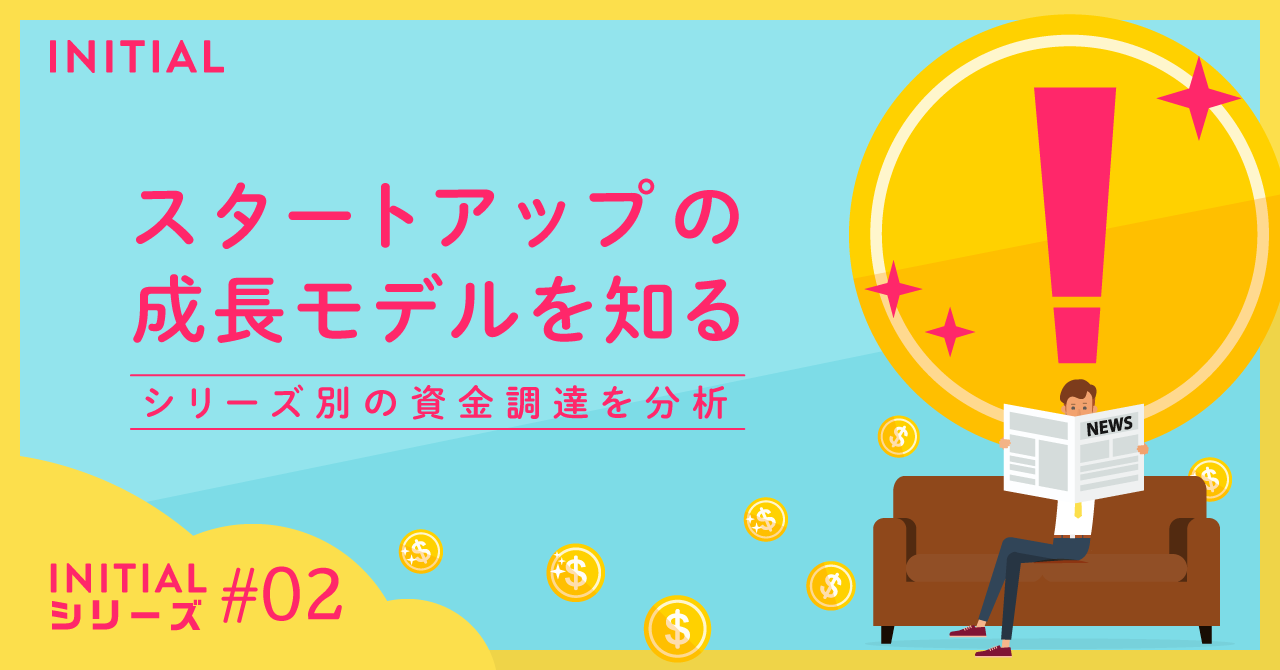“Japan Startup Funding” is a report detailing funding trends among Japanese startups that is independently researched and released on a bi-annual basis by INITIAL, Japan’s largest startup information database. This is an English translation of the summary report prepared in collaboration with NewsPicks’ editorial department in advance of the release of INITIAL’s full “Japan Startup Funding” report for 2020 (currently available in Japanese only).
Executive Officer and Senior Analyst at INITIAL/Uzabase
Part 1: Overview
2020 was a year significantly impacted by the outbreak of the COVID-19 pandemic, which had cast a long shadow over a wide range of economic activities across the world. Startup fundraising activity in Japan was no exception and, following the government's announcement of an official state of emergency in April 2020, the outlook for the startup market in May was not considered to be bright at the time.
Nevertheless, the total amount of funding raised (observable data as of January 25, 2021) by Japanese startups in 2020 stood at approximately JPY 461.1 billion (USD 4.32 billion), a figure which is projected to rise to an ultimate total of around JPY 480 billion (USD 4.49 billion) as further information is disclosed. This represents only a 10% YoY decline, despite the global ramifications of the COVID-19 pandemic, and can even be considered strong in comparison to other years over the previous decade (see below chart).
(*1) Conversion from JPY to USD throughout this report is based on the average mid-market exchange rate for each corresponding year.

A breakdown of funding amount by month reveals that the value remained high in April 2020 following the Japanese government’s announcement of a state of emergency. However, this was likely due to investments which had already been finalised prior to the announcement.
By May, the amount declined considerably, and there were concerns at one point that this slump would continue for a prolonged period of time. As can be seen in the below chart, however, these concerns ultimately proved premature as total funding recovered sharply from June onwards.

Referencing the values during the global financial crisis in 2008 for the sake of comparison, total startup funding slumped by 39% YoY from JPY 121.1 billion (USD 1.17 billion) in 2008 to JPY 74.4 billion (USD 0.80 billion) in 2009, and subsequently took six years to return to pre-crisis levels. While one cannot overlook the negative impact of the Great East Japan Earthquake (2011) on the speed of recovery during that period, it would still appear that startup funding during the COVID-19 pandemic has remained fairly robust in comparison.
At the same time, while the overall amount of funding was strong in 2020, there was a further decline in the number of companies which received funding—an ongoing trend since 2018. This would mean that, in turn, the amount of funding received per company is on the rise. In fact, historical data suggests that this has been the case since 2012 (see below chart).

Next, we will analyse some of the factors behind the increase in funding received per company.
In the below chart, we have plotted the median and mean deal values in relation to the number of years since a company’s establishment. This perspective reveals that the deal value has been growing at a more pronounced rate for companies that are more than five years old (in other words, later-stage startups).

In a nutshell, later-stage startups, which have already entered the business expansion phase of their development, have been attracting an increasingly high amount of investments.
Part 2: The Investors
In this section, we will analyse the factors behind the robust startup funding seen in 2020 from the perspective of trends on the investor side.
In essence, the primary factor supporting this robust trend was the fact that investments from general business corporations (non-financial) actually increased in 2020 rather than decreased. This is in contrast to what happened in the aftermath of the global financial crisis in 2008, when investments from many general business corporations, financial institutions, and financial VCs dropped sharply. In 2020, however, investment from general business corporations (GBC) rose by 12% YoY to JPY 140.4 billion (USD 1.31 billion). While the rise in startup investments by general business corporations observed over the last few years has been seen by some as a temporary boom, they do not appear to have withdrawn their funding in the face of COVID-19.

The ways that general business corporations in Japan invest in startups can, some exceptions aside, be broadly divided into the three routes outlined below.

Analysis of general business corporations engaging in direct investment (Route 1) reveals some interesting results. For example, it can be observed that these investors come from an increasingly diverse range of business domains, and it is no longer simply the same group of companies on the list every year, which had been the case in the past (see table below). This indicates the deepening of the investor pool in this category.

Our research reveals that NTT DOCOMO ranked first among general business corporations in terms of the total amount invested in Japanese startups in 2020, followed by Itochu. This comes as no surprise given that telecommunications and general trading companies have long ranked among the leading investors in Japanese startups. However, major pharmaceutical wholesaler Suzuken (6th place) and energy giant ENEOS (8th place), both of which are companies with long histories, are examples of new entries in the 2020 list.
Given the fact that the total value of an investment often remains undisclosed, the below list of the top 10 general business corporations in terms of the number of investment deals can also serve as a valuable reference point.

As seen in the above image, the top list is not just composed of emerging IT companies such as Akatsuki (1st) and United (tied 14th), which have been continuously investing in startups over recent years. It also features new companies such as Money Forward (tied 3rd) and Cyberdyne (tied 14th), both of which were listed in recent years. Marui Group (tied 3rd) is also a new entry but should really be looked at together with its subsidiary D2C&Co (12th) in order to get a more accurate idea of its overall startup investment stance. Together, the two companies made a total of 17 investments in 2020, a figure which would place them at the top of the list as a single entity.
This next section will take a look at trends in the area of CVC (corporate venture capital; Route 3). Generally speaking, when general business corporations first begin to invest in startups, they do so by investing in funds established by venture capital firms (VCs) as limited partners (LPs; Route 2). Subsequently, as their level of commitment to investing in startups intensifies, they may establish CVCs in order to have control over their own investment decisions. While the number of new CVCs established in Japan declined YoY in 2020, it has remained in double digits since 2015, a comparatively high level for the country in comparison to previous years (see below image).

In terms of value, CVC investments recorded a marginal YoY increase from JPY 21.4 billion (USD 0.20 billion) in 2019 to JPY 23.1 billion (USD 0.22 billion) in 2020, and their share in total investment deal value has also gradually expanded. These facts indicate that the investor sentiment continues to be positive in Japan's CVC domain.

The source of CVC investment in the above chart are funds affiliated with general business corporations (Route 3). As such, the amount of funding allocated by these corporations for CVC investments naturally serves as a leading indicator for overall CVC investment trends in the country.
In 2020, while the number of new funds established by general business corporations fell YoY, their overall value actually rose YoY.
This is thought to be due to an increase in general partnership (𝙣𝙞𝙣𝙞𝙣 𝙠𝙪𝙢𝙞𝙖𝙞) funds, which are a type of investment vehicle unique to Japan. These 𝙣𝙞𝙣𝙞𝙣 𝙠𝙪𝙢𝙞𝙖𝙞 funds are established by two companies (a general business corporation and a VC) and serve as a way for corporations to leverage the expertise of VC firms to carry out investment activity. The number of corporations using this form of investment vehicle has been on the rise in recent years (see below chart).

In the past, some have referred to the rising startup investments by corporations as just a “temporary boom”, often looked upon unfavorably by traditional VCs and startup companies alike. Nevertheless, data for 2020 indicates that general business corporations are finally putting serious thought and resources into startup investment, which could disprove some of the earlier “temporary boom” criticism.
Part 3: The Startups
Our attention now turns to the startups that attracted investments in 2020.
The top 20 startups in Japan in 2020 in terms of amount of funding raised are listed in the below diagram.

It should be noted that more than half of these companies received their funding in the latter half of the year. Following an uncertain first half in the face of the COVID-19 pandemic, it would appear that many funding rounds took place in the second half as sentiment stabilized to a certain extent.
Mobility Technologies (formerly JapanTaxi) raised the largest amount of funding of any startup in Japan in 2020. In April, the company integrated with DeNA's "MOV" business and now primarily operates the "GO" taxi dispatch. Mobility Technologies had previously attracted large-scale investments in funding rounds involving business corporations such as Toyota and NTT Docomo, and in 2020 also formed business partnerships with KDDI, Tokyo Century, and Dentsu Group. The fact that telecommunications giants NTT DOCOMO and KDDI are both investors in this company is a rare example of direct competitors investing in the same startup.
In second place was Playco, a pioneering developer of instant play games which is headquartered in Tokyo. All four of the company's founders have game development experience in both Japan and Silicon Valley.
Yamagata-based Spiber, which ranked sixth, aims to develop and industrialize innovative protein materials produced through its unique microbial fermentation process. Expectations are high for the company as a local, university-affiliated R&D startup. It had previously received support from business corporations, financial institutions, VCs, and a variety of other shareholders, with its most recent funding round commencing in late 2019. In September 2020, the company announced a partnership with Archer-Daniels-Midlands (ADM), a leading US grain processor, and expectations in terms of mass production are rising as a result.
Spiber also secured about USD 240 million in late December 2020 through the utilization of a value securitization structure which will be put towards the construction of a mass-production facility in the US. Note, however, that value securitization is a funding method that does not affect a company’s capital, and this USD 240 million is thus not included as part of its funding total in 2020, in accordance with INITIAL's definition.
The latest top ten list of Japanese startups in terms of post funding valuation (see below) is also likely to be of interest to readers.

All companies in this top ten list raised funding within the past three years, while seven of them have become so-called unicorns with market caps of over JPY 100 billion. Note that a market cap of more than JPY 100 billion would place a startup in the top 20% of all domestic listed companies in Japan.
Part 4: The Sectors
Breaking down funding by sector provides a different perspective to the overall picture of startup funding trends in Japan. A comparison of the top ten sectors in terms of funding raised in 2019 and 2020 shows that the strong presence of the SaaS and FinTech sectors remains unchanged. The AI sector, meanwhile, which has close ties to both SaaS and FinTech, stands out in particular at the top of the 2020 list (see below diagram).

Also of note in the 2020 list are three new entries: the CleanTech, sharing economy, and drug manufacture/discovery sectors. The rise of the CleanTech sector has been driven in part by the continuously high amount of investments attracted by companies such as APB, which develops next-generation lithium ion batteries, TBM, which develops an innovative limestone-derived material "LIMEX", and Looop, which develops solar power plant systems.
The sharing economy sector, meanwhile, was given a significant boost by the large investments attracted by Mobility Technologies, in addition to other factors.
While there were initial concerns that the outbreak of the COVID-19 pandemic would hinder growth in Japan's sharing economy and 𝙢𝙞𝙣𝙥𝙖𝙠𝙪 (private lodging, exemplified by Airbnb) sectors, the second half of 2020 saw INFORICH, which operates a battery sharing service, raise JPY 2 billion (USD 18.72 million), and LUUP, which operates an electric micro-mobility scooter sharing service, raise around JPY 500 million (USD 4.68 million).
A significant amount of attention and investment has been focused in recent years on startups developing services in the areas of mobility, FinTech, and corporate digital transformation (DX). The outbreak of COVID-19 has served as a tailwind for the development of these sectors, given the importance being placed on avoiding physical human contact and the potential role these sectors can play in minimizing the spread of the virus.
COVID-19 has also played a hand in the rise of the drug manufacture/discovery sector. While one would assume that this is due to the demand for vaccines, the actual drivers of growth here were the second and subsequent funding rounds of existing startups. These include Human Life CORD, which develops regenerative medicine and medical devices, Perseus Proteomics, which delayed its IPO, and LUCA Science, which develops mitochondrial therapeutic agents. Given the nature of the pharmaceutical business, startups in this sector tend to attract relatively large investments even from an early stage, as compared to their peers in the software industry, for example.
Part 5: IPOs
In this final section, we will outline startup IPO trends in 2020.
This year, a number of companies chose to postpone their IPOs, while a number of already listed companies saw their shares trade below issue price from March 2020 onwards. However, IPOs resumed from around mid-June to a favorable level. As a result, the total number of startup IPOs stood at 50 in 2020, up from the total of 43 in 2019 (see below chart).

The median market capitalization at the time of IPO (opening price) in 2020 was JPY 17.7 billion (USD 165.70 million), up from JPY 17.5 billion (USD 160.48 million) in 2019. As mentioned earlier in this report, this is likely the result of a rise in large-scale IPOs, which is in turn the result of an increased number of startups continuing to raise funds through the private market up until the later stage of development, prior to the IPO.

The below diagram contains a list of the major startup IPOs in Japan in 2020.

The most valuable startup IPO in Japan in 2020 was that of PLAID. The company operates "KARTE", a customer experience (CX) platform that provides a real-time visualization of website visitors and mobile app users, helping companies find an optimal approach to such users.
Similar to Sansan and freee in 2019, PLAID also raised funds in a share offering in the global (private) market, and its initial market capitalization exceeded JPY 100 billion post-IPO.
Another stock of note in 2020 was Modalis Therapeutics. Amid the numerous software startup IPOs in Japan, this company stands out as a biotech startup that carried out an IPO just four years after its founding in 2016. With its original "CRISPR-GNDM" genome editing technology (an evolution of CRISPR) at its core, Modalis aims to develop therapeutic agents for treating serious genetic disorders.
In addition to its in-house R&D capabilities, the company is known for its “hybrid” business model that also involves research in collaboration with other companies. While the hurdles to reaching profitability are generally high in the biotech domain, Modalis was in the black at the time of its IPO. Following its listing, however, it revised its 2020 forecast downward to record an operating deficit.
Japan’s Startup Ecosystem Continues to Evolve
Overall, startup investment continues to account for a relatively small percentage of Japan’s GDP, and the country still needs to overcome numerous challenges before it begins to produce truly world-class startup companies.
Nevertheless, the depth of Japan’s startup investor pool, which was once limited to a number of software companies, continued to increase in 2020. There were also some notable new developments, including the entry of global investors, particularly in fundraising rounds for later-stage startups, and an increase in post-IPO fundraising.
In fact, it could be argued that the COVID-19 pandemic has actually had a positive effect on Japan’s startup ecosystem, drumming up an unprecedented level of support for startup companies in a wide range of quarters, not only from investors.
With its foundations now well established, Japan’s startup ecosystem is now steadily moving towards the next stage of evolution.
INITIAL’s Definition of “Startups” • Private companies in Japan (including domestic companies started by foreigners and overseas companies started by Japanese nationals). • Companies that possess unique technologies, products/services, or business models, and are investing in the growth and expansion of their own business. • Companies that are challenging the existing way of life in an attempt to bring about a new change, be it in terms of general lifestyle, society, economic models, or technology. • Other companies that INITIAL determined to be eligible.
Definition of “Funding” • Any increases in capital stock, including investment received at the time of company establishment, contribution for third-party allotment of shares, rights offering to shareholders, exercise of rights such as stock acquisition rights, public offering (excluding public offering via an IPO), issuance of convertible notes, or issuance of convertible equity. • ICOs are not included in the calculation as this method does not increase capital stock under the current accounting standards. • Does not include increase in cash due to acquisition, conversion into a subsidiary, or transfer of shares. • Since this survey focuses on startup funding, it excludes the cases when investment in startups is made by transferring shares held by VCs or acquisition/conversion to subsidiaries of companies, although those are sometimes included into the field of startup investment. • There are differences between the content of investment value and the fundraising deal value and, thus, they are not equal.
This Report’s Scope This particular report focuses primarily on the highlights of funding trends within the Japanese startup ecosystem. For detailed information and comparisons, please refer to the full report (available in Japanese only).
Full Report Content (Japanese Only)
Author: Atsuko Mori
Editor: Mitsufumi Ikeda (NewsPicks)
Research: Takeshi Fukui, Takashi Kusumoto, Kana Akashi, Ryo Hirakawa
Design: Naomi Hirota, Eri Ishimaru
English Version: Luke O’Donovan, Victor Makhnutin, Mifnaz Jawahar






